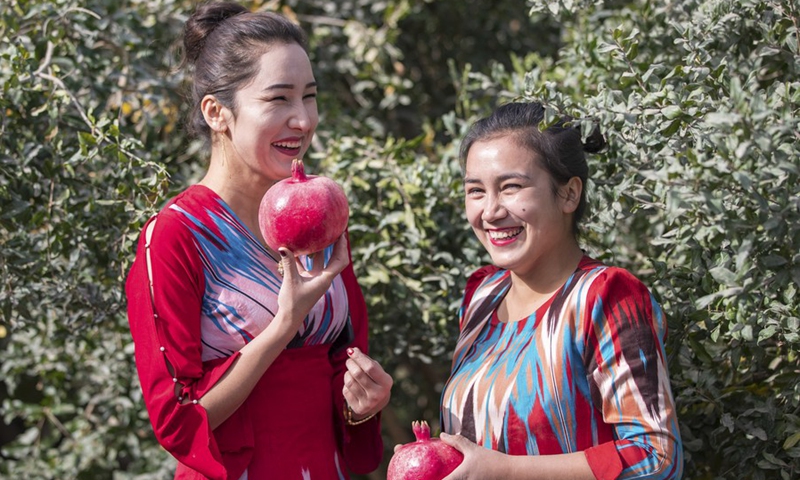Products from Xinjiang become hot sellers as consumers show support amid Western attacksRed socks made of cotton from China’s Xinjiang Uygur Autonomous Region with images of a tiger (the zodiac for 2022), delicious apples and walnuts from Aksu Prefecture, Chinese dates from Hotan Prefecture, raisins from Turpan City… Chinese people are enthusiastic about adding these products from Xinjiang to their shopping lists for the upcoming Spring Festival this year, not only to support the region’s economic development but also to respond to the rampant hyping of disinformation on Xinjiang by the US and West.
The Global Times has learned from some retail groups in China and some online shops that products from China’s Xinjiang have been hot sellers, especially for the Spring Festival – a traditional shopping gala for Chinese people.
Starting on December 24, 2021, supermarket chain Carrefour organized an online and on-site promotion activity for products from the Xinjiang region. With sufficient stock, products like nuts, fruits, liquor and cotton products from the region have been hot sellers, Carrefour said in response to an interview request from the Global Times.
It said that a gift box of apples from Aksu Prefecture is especially popular among consumers, with sales increasing 86 percent and sales of walnuts increasing 324 percent quarter-on-quarter.
Xinjiang is also the second-largest base for direct purchases in China, accounting for 15 percent of the total direct purchases of Carrefour, the company said.
A response from Chinese retailer Suning.com also showed the popularity of Xinjiang products. From January 1-18 and for the Spring Festival gala, the products from the Xinjiang region, including pears from Korla county of Aksu Prefecture, towels and bedding made of Xinjiang cotton have been selling fast.
For example, sales of cotton products increased 315 percent and sales of Chinese dates increased 437 percent quarter-on-quarter.
Retailers based in the Xinjiang region are also embracing a busier season this year.
Turgun, a resident from Urumqi who owns a booth inside the Xinjiang International Grand Bazaar, was busy sending packages of products to many cities across China in recent days.
“Chinese dates, raisins and snacks from my booth are very popular. See the Chinese dates here in the box? I gave discounts to one of my regular consumers in Shanghai – 71 yuan ($11.2) for a kilogram. The package will depart today,” Turgun said, showing packages piled up besides his booth to the Global Times during a virtual interview on Thursday.
There were also visitors to the Grand Bazaar who came to Turgun’s booth and asked about the price of raisins. Turgun happily invited them to take a taste for free.
Turgun said that his business, which has not been affected by COVID-19, has improved in recent years as more people learn about Xinjiang and thanks to the convenient delivery service.
He thought that discussions centered on Xinjiang cotton in recent years and the latest controversy of Sam’s Club, which was found to be removing products from Xinjiang, may help promote the popularity of Xinjiang products.
Many cities in China, including Xiamen, Hangzhou and Ningbo, have witnessed a wave of membership cancellations of US supermarket brand Sam’s Club, as Chinese consumers criticized the brand for removing products from Xinjiang following the US government’s action to ban imports of all products from the region, citing “forced labor” concerns.
Similar moves have been taken by Chinese consumers in recent years as the US and the West ramped up efforts to spread disinformation about China’s Xinjiang and used so-called concerns on human rights to impose sanctions.
For example, in March 2021, Chinese netizens said they will not buy from H&M after the company announced it was avoiding Xinjiang cotton. Its sales in China plummeted 28 percent in Swedish krona terms in the second quarter from the year before, per the quarterly results.
“We always do festival shopping, so why not Xinjiang products? We buy products from the Xinjiang region to show our support to the region – it’s more like a message to the US and those who are hyping Xinjiang topics to attack China, that we Chinese do not fear them.
“Moreover, these Xinjiang products, especially the cotton, offer really good quality!” a netizen commented on Sina Weibo, posting pictures of apples and pears she bought from Xinjiang.
“Buy, Buy, Buy” seems to be one way for many Chinese to show their support for the Xinjiang region’s development.
“In March 2021, Li Jiaqi, a top livestreamer in China, helped make 600,000 deals for Xinjiang products worth 6.54 million yuan over one night, and consumers swarmed into the livestreaming room to show their support for Xinjiang.
Farmers pick megranates in Pishan County of Hotan, northwest China’s Xinjiang Uygur Autonomous Region, Oct. 8, 2020. Photo: Xinhua



